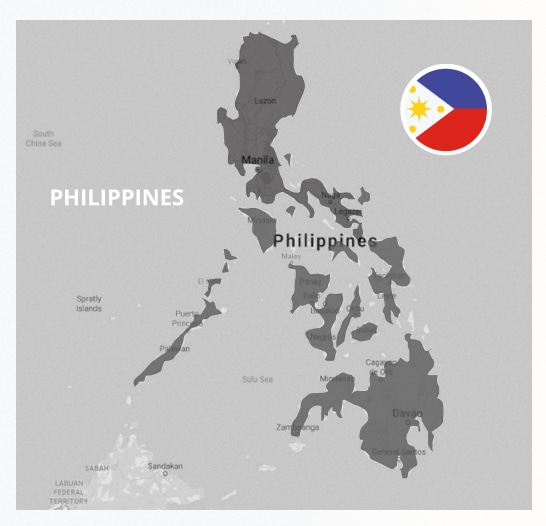Market Spotlight: The Philippines



-
The Philippines’ economic freedom score of 61.1 makes it is the 80th-most free economy in the world, according to Heritage Foundation.
-
Despite a recent economic downturn during the pandemic, today the Filipino economy has rebounded and is one of the fastest-growing emerging markets.
-
The Philippines is a very dynamic economy with a heavy reliance on international trade.

-
The Philippines is highly-proficient in English, with the EF English Proficiency Index ranking 18th (of 122 countries) and 2nd (of 24) in Asia, a result of its colonial history.
-
English and Filipino are the main languages taught and used in primary and secondary schools, which is only mandatory for about 10 years. Tagalong is one of the 19 recognized regional languages.
-
In the Philippines, English proficiency is closely correlated with economic growth and education quality.

-
Filipino workers are some of the most highly-skilled, efficient, and hard-working in the world. This, coupled with high English proficiency, attracts international firms seeking labor to manufacture consumer goods, electronics, pharmaceuticals, and construction.
-
The Philippines’ employment rate was 94% in October 2022, a 0.3% decrease from previous reports, and an unemployment rate of 5.2%, according to Trading Economics.
-
The Philippines is a very dynamic economy with a heavy reliance on international trade.
-
The minimum wage is 570 PHP/day, equivalent to $9.73/day, making this market attractive to foreign investors seeking highly-affordable labor options.

-
The Philippines ranks 95 (of 190) on the ease of doing business scale, according to Trading Economics, an improvement from 124 in 2018. A relative lower ranking is due to the complex regulatory environment and weak property rights protections.
-
The International Trade Administration advises companies to be mindful of protecting IP; enforcement in the Philippines is “irregular and inconsistent.”
-
While the Philippines is the 64th most competitive nation (of 140), according to the World Economic Forum, foreign investors should be wary of judicial ineffectiveness and governmental integrity as weaknesses of the open market system.
-
Conducting business in the Philippines is complex but may be lucrative. Foreign investors are highly encouraged to partner with trusted, local advisors to expand operations here.

-
The Philippines’ deep colonial history contributes to its culture, blending Asian, European, and American values to create a unique union of Filipino politics and culture.
-
There is strong cultural diversity across the country and its islands, so in some regions for example, Spanish influence is more prevalent. While there is a strong national identity, it’s important for you to understand local, regional nuances when conducting business.
-
When conducting business in the Philippines, be punctual and respect hierarchies within the organization. For some social occasions, arriving on time may seem like a sign of over-eagerness, so a slightly late arrival is recommended.
-
Filipinos value family and so many family-owned conglomerates dominate the markets. It is important to have strong relationships with individuals to help you guide the market. However, allow for time to build and strengthen your connections.
-
The Philippines practice a high-context culture, emphasizing contextual clues and body language.

-
This market is heavily reliant on international trade and foreign direct investment to contribute to economic growth and warmly welcome foreign investors, so tax rates are more moderate than other Southeast Asian markets.
-
The Philippines recently removed tariffs on nearly all goods from ASEAN trading partners under the ASEAN Free Trade Area Agreement, making it more attractive for member countries to do business here. However higher tariffs should be expected for Western investors.
-
Despite a weak infrastructure and inconsistent regulations, business, labor, and monetary freedom are all on the rise since 2021.


